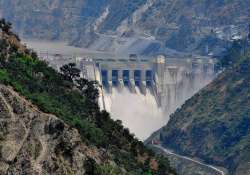Pakistan, India to hold high-level water talks in US in April: Report
Following the intervention of the US and the World Bank, India and Pakistan will be returning to the negotiating table over the disputed hydropower projects in the Indus Valley in April.

Following the intervention of the US and the World Bank, India and Pakistan will be returning to the negotiating table over the disputed hydropower projects in the Indus Valley in April.
Water and Power Minister Khawaja Mohammad Asif said on Monday that the two nations would hold three-day secretary-level talks on the Kishanganga and Ratle hydropower projects, under the aegis of the World Bank, in Washington from April 11, reported Dawn on Tuesday.
Speaking on the sidelines of the two-day talks between Indus Water Commissioners from both sides, the minister welcomed New Delhi's decision to resume negotiations under the 1960 Indus Waters Treaty on the proposed Pakul Dal, Miyar and Lower Kalnai hydropower projects, to which Pakistan has raised objections.
"The US has intervened at the highest level to help both countries resolve the issue. There will be secretary-level talks on the Ratle and Kishanganga hydropower projects in Washington on April 11, 12 and 13," Mohammad Asif said at a press conference here.
"We are happy that India has finally agreed to resume talks at the commission level. We welcome this decision and the visit of the Indian delegation," he added.
The 10-member Indian delegation currently in Islamabad is led by Indus Water Commissioner P.K. Saxena.
Pakistan has been protesting over the design and construction of two controversial projects, the 330 MW Kishanganga hydroelectric project and the 850 MW Ratle hydroelectric project on the tributaries of the Indus in the Indian part of Jammu and Kashmir.
Asif claimed that the World Bank-sponsored International Court of Arbitration had given its verdict in Pakistan's favour over the Kishanganga project and Islamabad was now demanding that it be implemented, the daily reported.
The Indus Waters Treaty was signed in 1960 and involves six rivers: the Beas, Ravi, Sultlej, Indus, Chenab and Jhelum.
Brokered by the World Bank, the treaty gave the right to use waters of the first three rivers to India and of the the other three rivers to Pakistan.
India has said it has the right under the treaty to set up hydro power plants on the tributaries of the rivers flowing through its territory. Pakistan fears this might reduce the water flow of the rivers into its territory.
The two countries held the Indus Water Commission meeting last time in May 2015 in New Delhi.